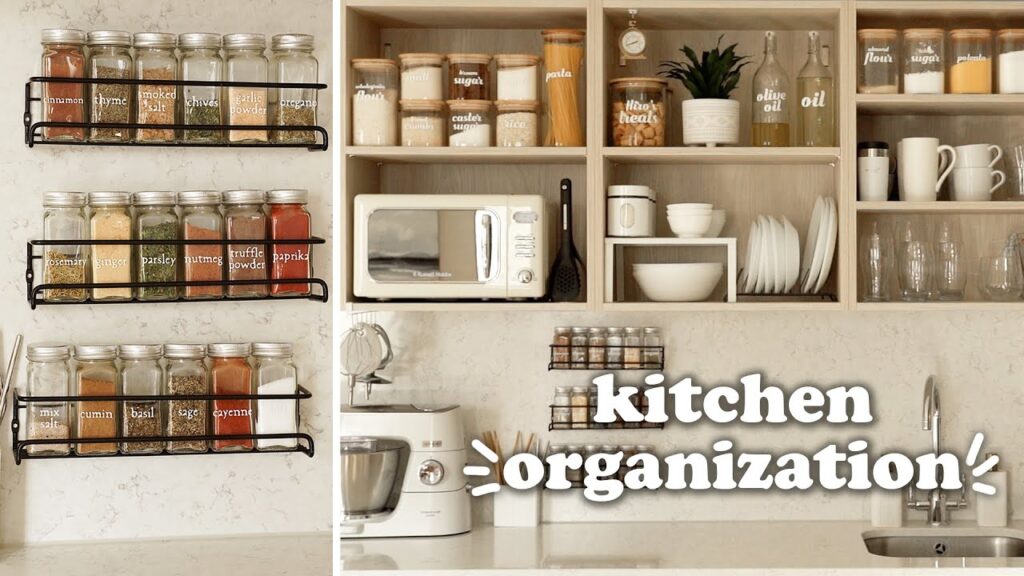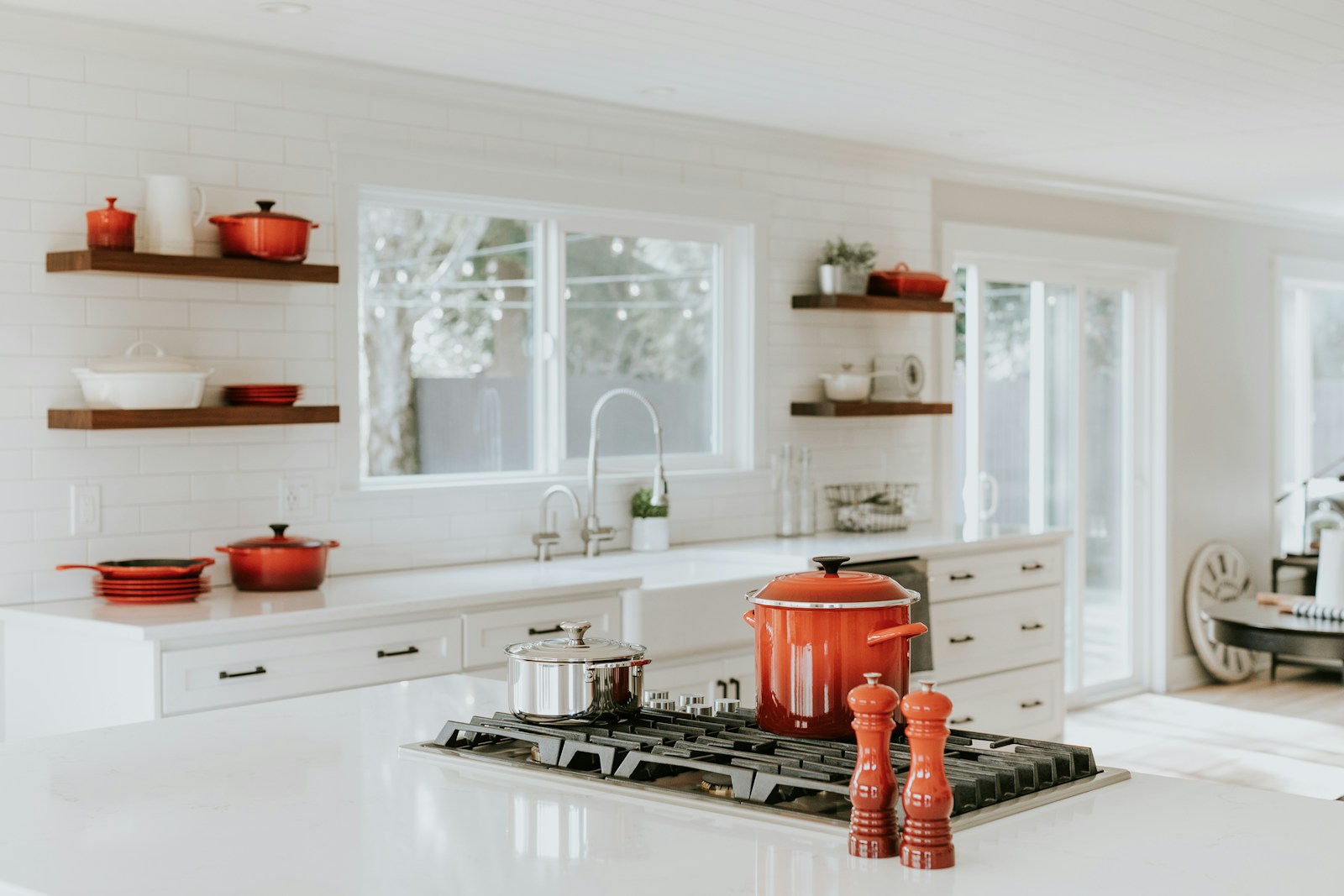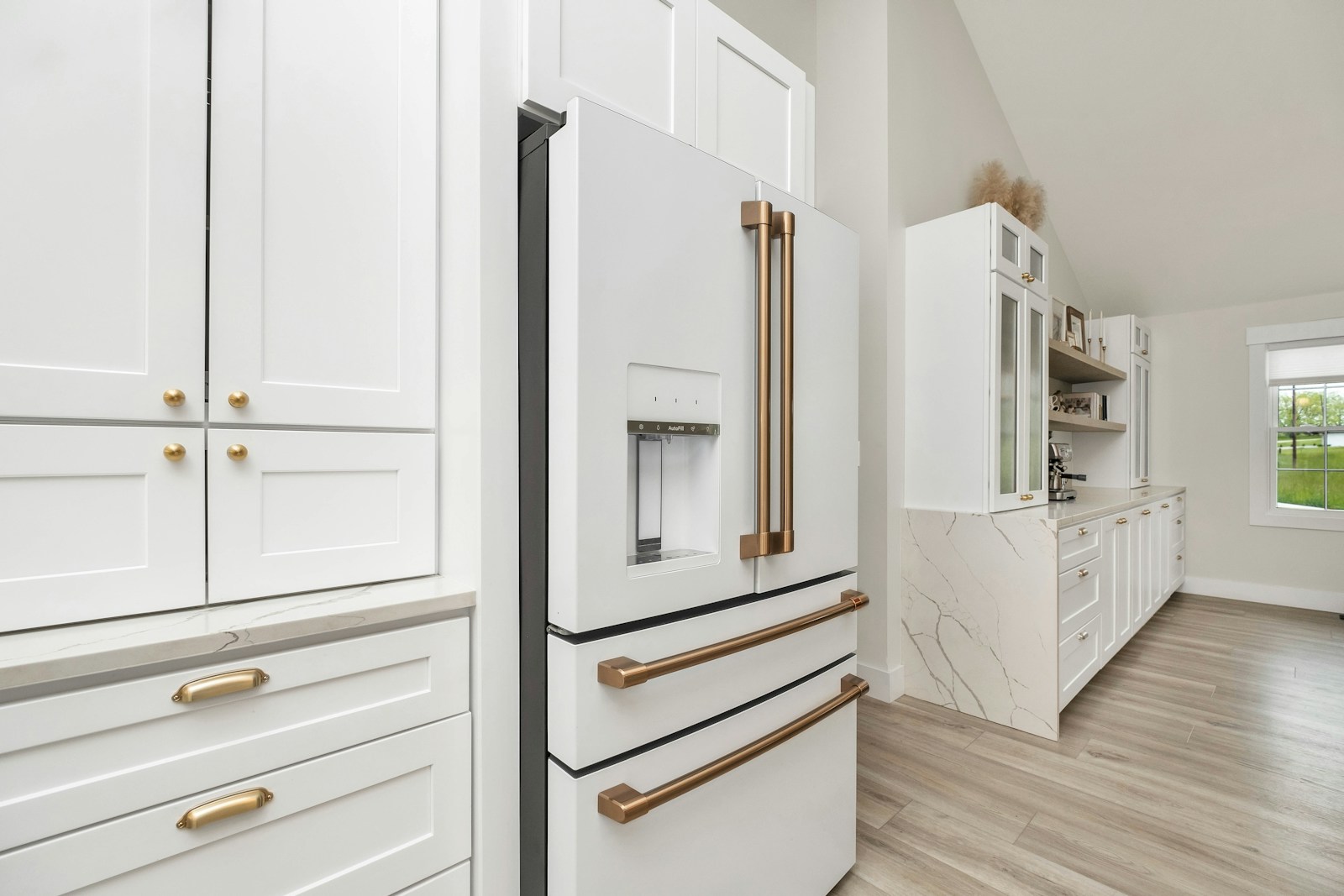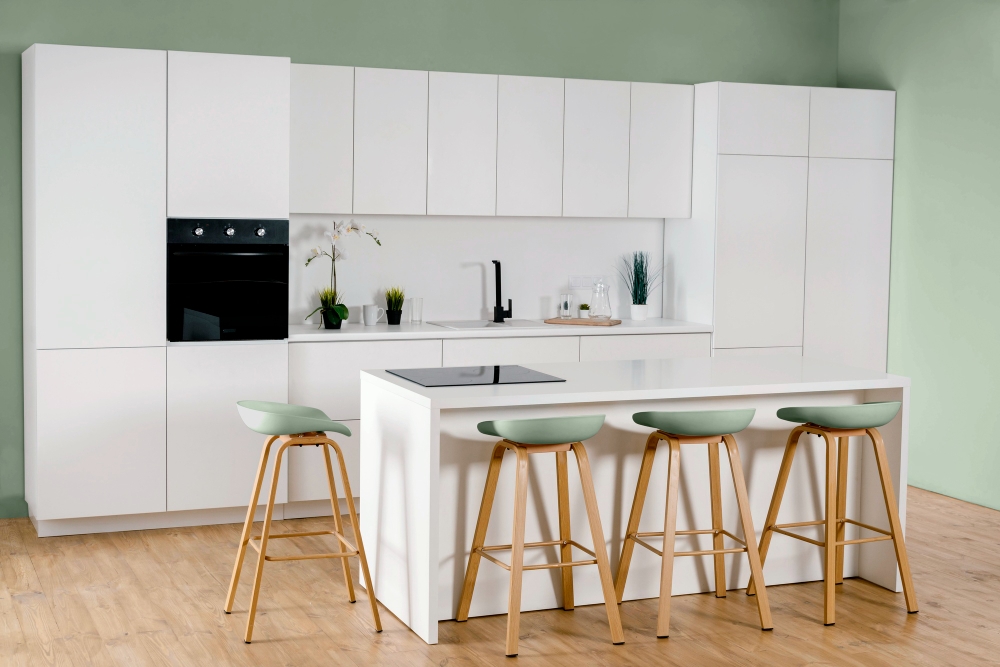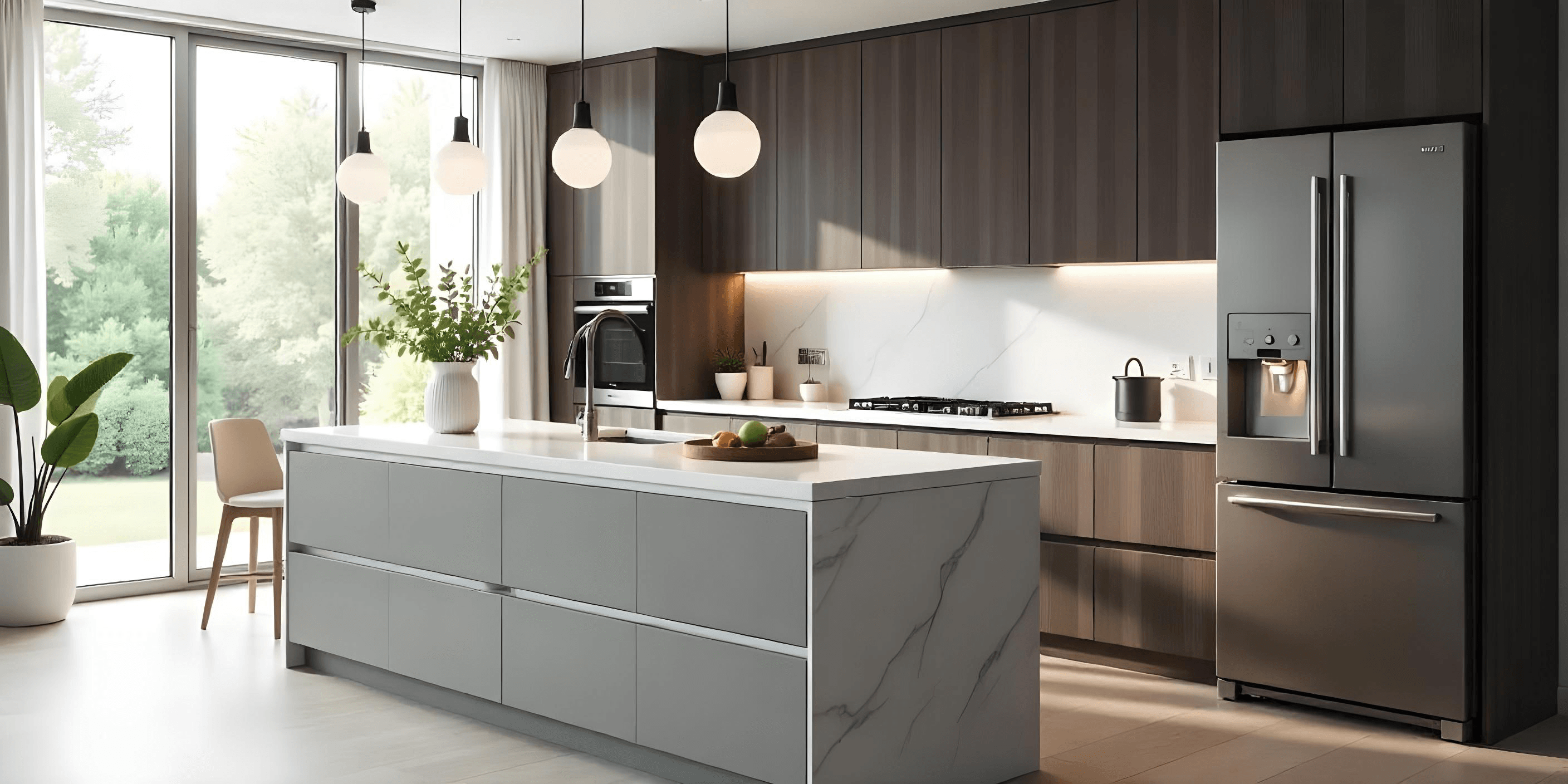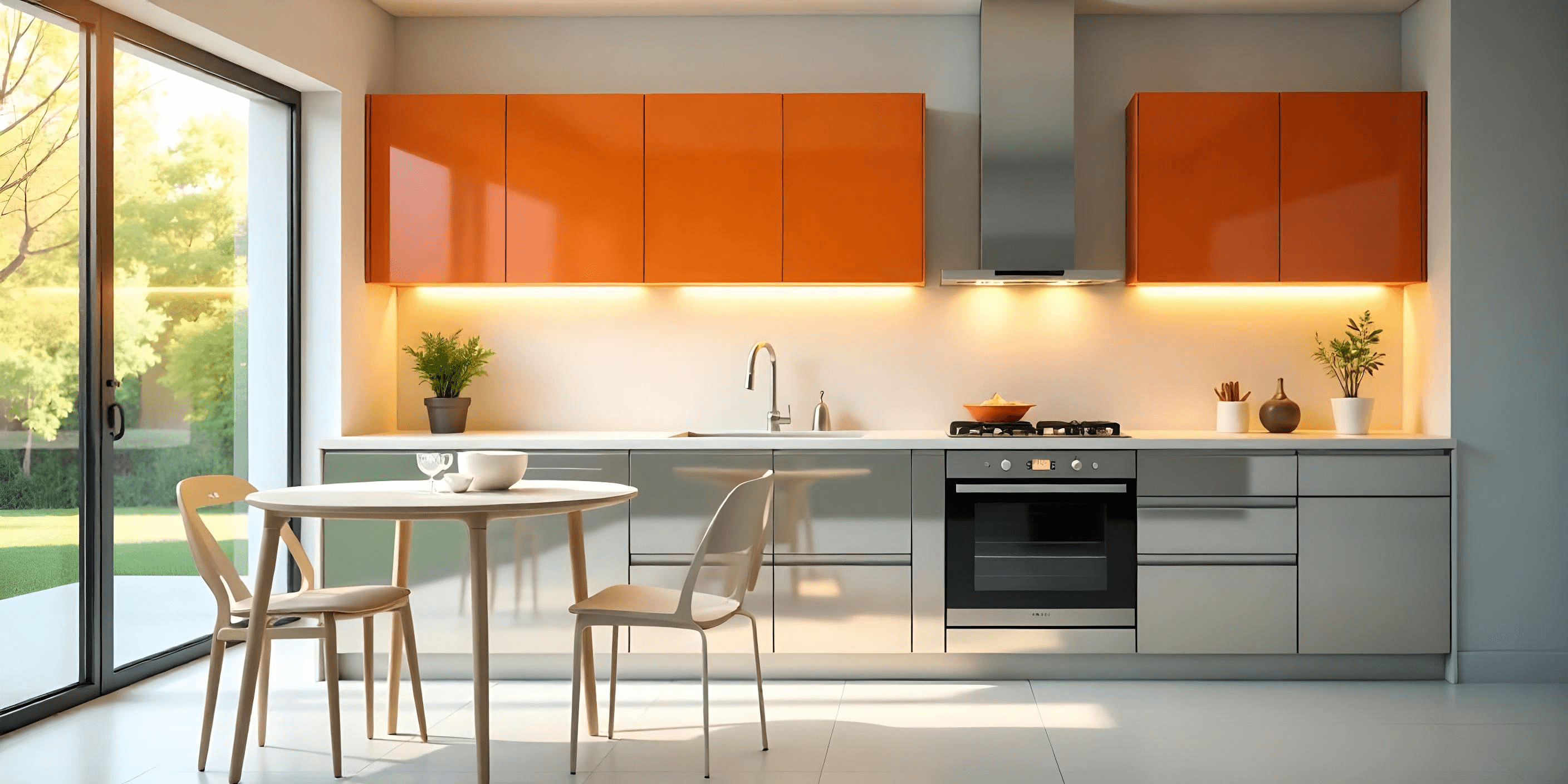Feeling overwhelmed by overflowing kitchen cabinets? You're not alone! Many home cooks struggle to keep their cabinets organized with all the essential tools, dishes, and ingredients. But fear not! By implementing a few simple strategies, you can transform your cabinets from chaotic clutter to a haven of efficiency.
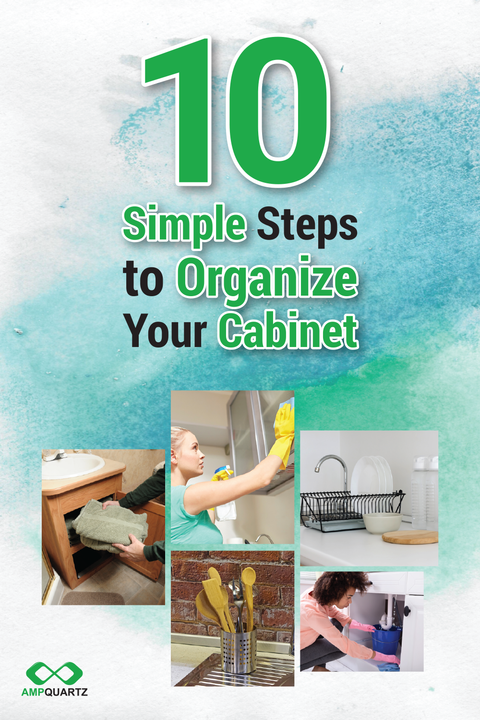
10 steps to organize kitchen cabinets:
-
- Remove everything from your kitchen cabinets
- Declutter them
- Clean thoroughly
- Line your kitchen cabinets
- Categorize your items
- Put the right things in the right places
- Place dishes you use most often in accessible cabinets
- Store fragile items high up
- Stack pots and pans in lower cabinets near the stove
- Place cleaning supplies under the sink
- Designate kitchen drawers for oft-used items
- Full-use all those spaces
- Buy some special items for your kitchen
- Declutter your counter
- Maintain your cabinets organization
Kitchen Organization Step #1. Remove everything from your kitchen cabinets
 Image credit: Canva
Image credit: Canva
The key to a successful kitchen cabinet organization project is a clean slate. Begin by removing everything from your cabinets. This might seem daunting, but trust us – it's the first step to achieving order!
Benefits of a Clean Slate:
- Clear Assessment: Emptying your cabinets allows you to see exactly what you have, making it easier to categorize, declutter, and identify unused items.
- Space to Breathe: Having everything out frees up workspace for sorting and organizing your belongings.
Pro Tip: Spread everything out on your countertops or a large table. This way, you can easily categorize items and assess their condition before returning them to their new, organized home.
Kitchen Organization Step #2: Declutter them
 Image credit: Canva
Image credit: Canva
Now that everything is out of the cabinets, it's time to make some tough decisions! Grab a trash bin and two boxes – one for donations and one for selling (optional). Here's how to sort through your belongings:
- Be Ruthless: Be honest with yourself. If an item is expired (food), broken (dishes), mismatched (containers), or unused (appliances/gadgets) in over a year, let it go! Toss it in the trash bin.
- Give it a Second Life: If an appliance or storage container is still in good condition, consider giving it a new home. Place these items in the designated donation box.
- Monetize (Optional): If you have high-quality items you no longer need, consider selling them online or at a local consignment shop. Place these items in the separate “sell” box (optional).
Benefits of Decluttering:
- Clarity: By removing unused items, you gain a clearer understanding of what you actually own and use.
- Organization Ease: A less cluttered cabinet is easier to organize and maintain. Cleaning becomes a breeze!
Kitchen Organization Step #3: Clean thoroughly
 Image credit: Canva
Image credit: Canva
With your cabinets emptied and decluttered, it's the perfect time for a deep clean! Grab your favorite cleaning supplies and get ready to banish grime and dust bunnies.
- Wipe Down Surfaces: Use a damp cloth with mild soap or a suitable all-purpose cleaner to wipe down cabinet doors, shelves, and drawer interiors. Pay particular attention to any spills or greasy fingerprints.
- Tackle Tight Spaces: For those hard-to-reach nooks and crannies, use a microfiber cloth or a small vacuum cleaner attachment to remove crumbs and dust.
- Don't Forget the Dishes! While your cabinets are sparkling clean, take this opportunity to wash any dishes or cookware you removed. Returning clean items to clean cabinets ensures a fresh and organized space.
Benefits of a Deep Clean:
- Pest Prevention: A thorough cleaning removes crumbs and food residue that can attract unwanted pests.
- Improved Hygiene: Cleaning cabinets helps to maintain a sanitary environment for your food storage items.
Deep Cleaning Resources:
For a more comprehensive deep cleaning guide, check out this article: How to Deep Clean Kitchen Cabinets: link to your article on deep cleaning cabinets.
Kitchen Organization Step #4: Line your kitchen cabinets
While not essential, adding a fresh touch to your clean cabinets can further enhance the space. Here are two optional ideas:
-
Cabinet Liners: Consider using shelf liners. These come in various materials like paper, vinyl, or even rubber. They offer several benefits:
- Protection: Liners help shield shelves from spills and stains, making cleanup easier.
- Grip: Certain liners provide a non-slip surface, preventing dishes from slipping or toppling over.
- Aesthetics: Liners come in a variety of patterns and colors, allowing you to add a decorative touch to your cabinets.
-
Scented Sachets (Optional): For an extra layer of freshness, you can place scented sachets within your cabinets. Choose scents that are pleasant but not overpowering, like lavender or vanilla.
Kitchen Organization Step #5: Categorize your items
Now that you have a clean slate and a decluttered selection of items, it's time to strategically put everything back in its place. Here are some tips to maximize efficiency:
- Zone It Out: Think about your kitchen workflow. Store items closest to where you use them most frequently. For example, keep baking supplies near the oven, and everyday dishes near the dishwasher. Don't be afraid to rearrange things from their previous locations for optimal convenience.
- Categorize & Conquer: Group similar items together. Create designated areas for baking supplies, spices, dishes, and more. This makes it easier to find what you need quickly.
- Utilize Available Solutions: Take advantage of drawer organizers, shelf risers, and lazy susans to maximize cabinet space and improve accessibility. Many home improvement stores offer a variety of storage solutions.
- Consolidate & Contain: Instead of having plastic wrap, aluminum foil, and other similar items scattered around the kitchen, dedicate a drawer near the refrigerator for these essentials. This keeps them contained and easily accessible.
Kitchen Organization Step #6: Put the right things in the right places
Keeping your kitchen organized isn't just about aesthetics – it's about functionality. By strategically placing your items, you can create a kitchen that flows seamlessly. Here are some guidelines to help you put the right things in the right places for effortless access and a more efficient cooking experience:
(i)Place dishes you use most often inaccessible cabinets
 Image credit: Canva
Image credit: Canva
The key to an efficient kitchen is having your most-used items readily available. Here's how to strategically store your dishes:
-
Prioritize Accessibility: Store everyday dishes, plates, and bowls in easily accessible cabinets. This means avoiding deep base cabinets where you'd need to bend down.
-
Prime Locations: Opt for upper cabinets or mid-level drawers for frequently used items. This sweet spot eliminates the need for bending or crouching.
-
Lower Shelf Advantage: Within cabinets with multiple shelves, dedicate the lower shelf to your most frequently used dishes. This ensures effortless grabbing without having to reach over or behind other items.
(ii)Store fragile items higher up
 Image credit: Canva
Image credit: Canva
Upper cabinets are ideal for storing less frequently used or delicate items. Here's why:
- Out of Harm's Way: Placing items like fine china, stemware, serving platters, and fragile casserole dishes on higher shelves protects them from everyday wear and tear.
- Minimizing Breakage Risk: Storing these items out of easy reach reduces the chance of accidental drops or bumps, especially if you have young children in the house.
Alternative Storage Solutions (Optional):
If you find upper cabinets inconvenient or inaccessible, consider alternative storage solutions:
- Breakfronts: These standalone cabinets with glass doors offer both storage and display for special occasion dishes.
- China Cabinets: Similar to breakfronts, china cabinets provide a dedicated space for showcasing and protecting your finer tableware.
(iii)Stack pots and pans in lower cabinets near the stove
 Image credit: Canva
Image credit: Canva
Lower Your Back, Not Your Pots: Smart Pot and Pan Storage
The lower cabinets, those golden areas below the counter, are prime real estate for your pots and pans. Here's why:
- Strength Where It Matters: Lower cabinets are sturdier and can handle the weight of heavy pots and pans better than upper cabinets.
- Effortless Access: Bending down to grab a pot is easier than reaching up, especially for heavier items. Save your back and store frequently used pots and pans in lower cabinets that are easy to reach.
- Optimizing Space: Since lower cabinets are typically deeper, you can utilize vertical space for less-used items. Place less frequently used pots and pans on lower shelves or towards the back of the cabinets.
(iv)Place cleaning supplies under the sink
 Image credit: Canva
Image credit: Canva
The under-sink cabinet can be a hidden gem in your kitchen, offering valuable storage potential. However, it's best to utilize this space strategically:
-
Cleaning Central: This area is ideal for housing cleaning supplies like dish soap, sponges, trash bags, and rubber gloves. Keeping them contained under the sink helps maintain a clutter-free look on your countertops.
-
Leak Prevention Caution: Avoid storing food or cookware here, especially if you also keep cleaning products. Spills or leaks from cleaning supplies could contaminate food items.
-
Optimize Every Inch: Utilize under-sink organizers, pull-out shelves, or hanging racks to maximize space and keep cleaning essentials neatly arranged for easy access.
(v)Designate kitchen drawers for oft-used items
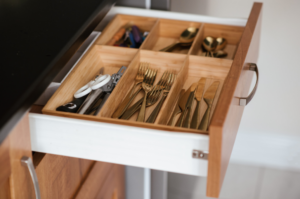 Image credit: Canva
Image credit: Canva
Kitchen drawers offer valuable real estate for storing utensils, tools, and other essentials. But let's face it, drawers can easily become chaotic catch-alls. Here's how to transform your drawers into organized havens:
-
Categorize and Conquer: Take everything out and sort your items into categories. Utensils, cooking tools, baking supplies, drawer liners – the possibilities are endless!
-
Tailor Your Organization: Every kitchen is unique. Think about how you use your space and what makes sense for you. Do you need designated compartments for spatulas, whisks, and spoons? Perhaps a drawer divider for pot holders and oven mitts?
-
Utilize Drawer Organizers: Invest in drawer dividers, utensil trays, or stackable containers. These tools can help you maximize space, keep items separated, and ensure everything has its designated spot.
-
Label It!: Consider labeling drawers with categories for easy identification. This is a time-saver, especially if multiple people use the kitchen.
Kitchen Organization Step #7: Full-use all those spaces
 Image credit: Clean & Scentsible
Image credit: Clean & Scentsible
Not every kitchen cabinet is created equal. Some might be oddly shaped, deep, or shallow, leaving you wondering what to store there. Don't despair! Here are some creative solutions to maximize even the most challenging spaces:
-
Embrace the Awkward: Think outside the box! Consider using oddly shaped cabinets for specific items. Tall, narrow spaces are perfect for brooms, mops, or rolling pins. Deep cabinets can house large serving platters or baking sheets.
-
Bins and Organizers to the Rescue: Invest in bins, baskets, or drawer dividers to transform awkward cabinets into functional zones. These tools help create designated spaces for smaller items that might otherwise get lost in the abyss.
-
The Power of Verticality: Don't forget to look up! Maximize vertical space by adding shelves or utilizing hanging organizers. This is a great way to store spices, condiments, or canned goods in deep cabinets.
Kitchen Organization Step #8: Buy some special items for your kitchen
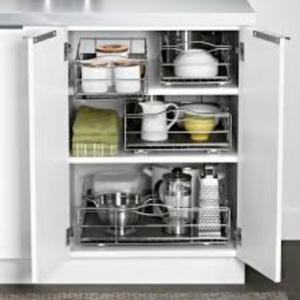 Image credit: The Container Store
Image credit: The Container Store
One of the main culprits behind kitchen cabinet chaos? Hard-to-reach items lurking in the back. Here's where pull-out cabinet organizers come in as heroes!
-
Effortless Access: These handy organizers slide out smoothly, bringing everything in the cabinet front and center. No more digging around or blindly grabbing for pots and pans in the back.
-
Maximize Space: Pull-out organizers often have tiered shelves or compartments, allowing you to utilize the entire cabinet depth effectively. This is a game-changer for deep cabinets that tend to become black holes for forgotten kitchenware.
-
Improved Organization: With everything neatly displayed and accessible, you can easily find what you need, keeping your kitchen workflow smooth and efficient.
Consideration: While pull-out organizers are fantastic, they do require some cabinet space for installation. Ensure they'll fit properly before purchasing.
Kitchen Organization Step #9: Declutter your counter
 Image credit: Canva
Image credit: Canva
Kitchen counters are prime real estate for food prep and cooking. But clutter can quickly take over, hindering your workflow. Here's how to keep your counters clear and functional:
-
Corral It: Invest in stylish containers, baskets, or trays to house frequently used items like oils, spices, utensils, or condiments. This not only keeps things organized but also adds a decorative touch.
-
Maximize Workspace: When counter space is limited, every inch counts. Clearing clutter creates a more spacious and inviting environment for cooking.
-
Think Vertical: Utilize wall-mounted shelves, utensil rails, or pot racks to free up counter space and keep essentials within easy reach.
-
Declutter Regularly: Be ruthless! Identify items that rarely get used and relocate them to cabinets or donate them.
Kitchen Organization Step #10: Maintain your cabinets organization
 Image credit: Canva
Image credit: Canva
Maintaining Kitchen Cabinet Bliss: A Teamwork Approach
Congratulations! You've conquered kitchen cabinet chaos. Now, let's ensure it stays that way. Here are some tips for long-lasting organization:
-
Shared Knowledge is Shared Responsibility: Involve everyone in the household! Make sure everyone knows where things go. Labeling shelves, containers, or even cabinet doors with clear categories can be a game-changer.
-
Lead by Example: Always put things back in their designated spots after use. This sets a positive tone and encourages others to maintain the organized system.
-
Regular Reviews: Schedule decluttering and reorganization sessions at least once or twice a year. This helps get rid of unused items and keeps your cabinets functioning at their best.
Bonus Tip: Hold a family meeting to discuss the importance of keeping the kitchen cabinets organized. Explain how it benefits everyone by saving time, reducing frustration, and creating a more pleasant cooking environment.
Keeping it Beautiful: An organized kitchen is a joy to use! The more you maintain this system, the more you'll appreciate the functionality and beauty of your well-organized cabinets.
Want to organize kitchen cabinets?
Organized cabinets are the backbone of a beautiful and efficient kitchen. When it comes to selecting cabinets, quality matters.
Here are some key factors to consider when choosing cabinets:
- Durability: Look for cabinets made from sturdy materials that can withstand everyday wear and tear.
- Storage Solutions: Consider cabinet styles and layouts that offer the functionality you need for your kitchen workflow.
- Aesthetics: Choose a cabinet style and finish that complements your overall kitchen design.
Conclusion
By following these steps, you've transformed your kitchen cabinets from chaotic to clutter-free! The benefits extend far beyond aesthetics. An organized kitchen can save you time and money, streamline your meal planning, and make cooking a more enjoyable experience. Plus, keeping things clean becomes a breeze when everything has a designated spot.
Maintaining the Magic:
Remember, organization is an ongoing process. Schedule regular decluttering sessions to keep your cabinets functioning at their best. With a little effort, you can enjoy the beauty and functionality of an organized kitchen for years to come.

